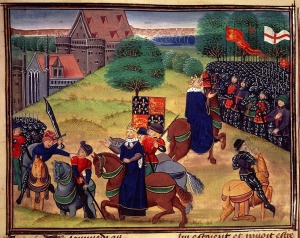London and the Peasants' Revolt - WCF fundraising talk on 15 June 2021
The Fletchers celebrate their 650th anniversary in 2021. It gave us great pleasure, then, to offer on 15 June 2021 a webinar on an event which occurred 640 years ago on that very day - the meeting of Wat Tyler and other rebels with the King at Smithfield (close to the location of Farmers and Fletchers Hall). We were delighted too that the Sheriff Michael Mainelli had agreed to introduce the webinar, which was a fundraising event for the Fletchers Trust and for the Sheriffs' and Recorder's Fund, and attended by over 200 people worldwide.
The Master Fletcher, Anne Curry, is involved with colleagues from the Universities of Reading, Oxford, Glasgow and Southampton in a new historical research project on The People of 1381. London features so prominently in the revolt of that year since rebel groups from Kent, Essex and Hertfordshire rushed to the capital to put their petitions to the king. The webinar took us through each day from 12th to 15th June, mapping where incidents occurred in London and Westminster, and telling us of Londoners involved. So far no Fletchers have been found amongst them, save for men with that surname!
To watch the webinar here is the You Tube link: https://www.youtube.com/channel/UC8O_h4xXHxPmJgPeylhCdWw
Watch this space for updates on the fundraising (which so far has raised £1300).
Past Clerks of the Fletchers
By the fifteenth century, most London companies employed professional clerks to keep their records. While at the end of the middle ages most merchants and substantial craftsmen would have been able to read or write (some degree of schooling was integral to a London apprenticeship), the clerks came from a world of professional administrators familiar with common practices of record keeping, and many of them, it has been suggested, were central also to the dissemination of early English literature, and of the traditions and customs that underpinned civic and company life. While the names of the Fletchers’ clerks are known only from the 18th century, there is no reason to doubt that they, like other companies, employed such professional administrators from an early date.
For more on the role of the early clerks more generally, see M.P. Davies, ‘ “Writying, making and engrocyng”: clerks, guilds and identity in late medieval London’, in Medieval Merchants and Money: Essays in Honour of James L. Bolton ed. Martin Allen and Matthew Davies (London, 2016), pp. 21-42.
| Dates | Clerk |
| 2022-present | Lt Col Deborah Taylor |
| 2012-22 | Kate Pink |
| 2010-12 | Georgina Butler |
| 2002-10 | Capt. Michael A. Johnson, RN |
| 1994-2002 | John R. Owen-Ward |
| 1984-94 | Jeremy R. Garnett |
| 1971-84 | Frank N. Steiner |
| 1965-71 | David J. Eldridge |
| 1963-65 | Jeffery N. Gallagher |
| 1947-63 | Lt.-Col. Richard John James Bale |
| 1938-46 | Percy Beaumont Shepheard |
| 1937-38 | Arthur Greeves (deputy clerk, locum tenens) |
| 1906-37 | Percy Beaumont Shepheard |
| 1890-1906 | Beaumont Shepheard |
| 1870-90 | Alfred James Shepheard |
| 1853-70 | Charles Shepheard |
| 1828-53 | John Finch |
| 1800-27 | John Delaval Hooper |
| 1793-1800 | Edward Theodore Hooper |
| 1782-93 | John Hooper |
| c1767-1782 | James Roberts |
| c1719 | Abraham Hemingway |
Agincourt 600
The Battle of Agincourt that took place on the 25th of October 1415 was a fascinating but controversial battle. The 600th anniversary of the Battle of Agincourt was commemorated in many different places and ways.
The Fletchers have been very active and supportive of commemorations for the 600th anniversary of the battle of Agincourt. Many City based events took place in the UK and France.
A Brief History of Arrowmaking
Article by Veronica-
Charismatic as the longbow may be, it cannot fulfil its function without the all important arrow.
Historically it is quite likely that a form of arrow might actually have preceded the bow; even today there are parts of the world where throwing arrows are used.

